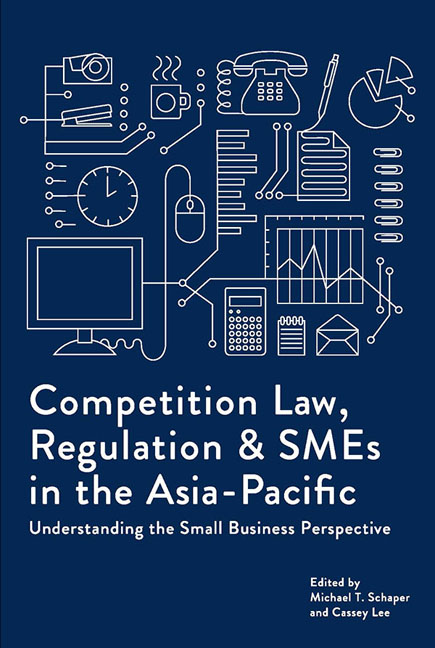 Competition Law, Regulation and SMEs in the Asia-Pacific
Competition Law, Regulation and SMEs in the Asia-Pacific Book contents
- Frontmatter
- Contents
- Foreword
- About the Contributors
- 1 Introduction: Making the Invisible SME More Visible in Competition Policy and Law
- Section 1 Theories And Basic Concepts
- Section 2 Smes And Competition Law
- Section 3 Country Studies
- 12 Competition Law, Regulation, and Trade: Implications for Productivity and Innovation in Singaporean Manufacturing SMEs
- 13 SME Law and Abuse of a Superior Bargaining Position in Japan
- 14 Competition Law, Policy, and Smes in South Korea
- 15 Competition Law Implementation and Smes: Singapore's Experience
- 16 Competition Law and SMEs in Indonesia
- 17 Smes and Malaysia's New Competition Law: Experiences to Date
- 18 Competition Policy and Sme Development in Vietnam
- 19 China's Anti-Monopoly Law and the Sme Sector
- 20 A New Competition Agency Learns to Deal with Smes: The Case of the Hong Kong Competition Commission
- 21 The Regulation of Television Programme Production Contracts under Japan's Subcontract Act
- 22 Small Enterprises and Competition Policy in Pacific Island Countries
- Index
15 - Competition Law Implementation and Smes: Singapore's Experience
from Section 3 - Country Studies
Published online by Cambridge University Press: 05 August 2017
- Frontmatter
- Contents
- Foreword
- About the Contributors
- 1 Introduction: Making the Invisible SME More Visible in Competition Policy and Law
- Section 1 Theories And Basic Concepts
- Section 2 Smes And Competition Law
- Section 3 Country Studies
- 12 Competition Law, Regulation, and Trade: Implications for Productivity and Innovation in Singaporean Manufacturing SMEs
- 13 SME Law and Abuse of a Superior Bargaining Position in Japan
- 14 Competition Law, Policy, and Smes in South Korea
- 15 Competition Law Implementation and Smes: Singapore's Experience
- 16 Competition Law and SMEs in Indonesia
- 17 Smes and Malaysia's New Competition Law: Experiences to Date
- 18 Competition Policy and Sme Development in Vietnam
- 19 China's Anti-Monopoly Law and the Sme Sector
- 20 A New Competition Agency Learns to Deal with Smes: The Case of the Hong Kong Competition Commission
- 21 The Regulation of Television Programme Production Contracts under Japan's Subcontract Act
- 22 Small Enterprises and Competition Policy in Pacific Island Countries
- Index
Summary
This chapter provides a ten-year review of the Singapore Competition Act from its introduction in 2005 up until 2014. The Competition Commission of Singapore (CCS) was established in 2005 to administer and enforce the Act. The CCS had the immediate task of helping businesses, especially small and medium-sized enterprises (SMEs), make the transition towards competition law compliance. However, CCS's enforcement experience and stakeholder engagement surveys over the last decade have revealed that most SMEs continue to be unaware of the prohibitions of the Act. CCS has had to modify its SME engagement strategy, innovating along the way. In the decade of its existence, the CCS has learnt some important lessons that may prove helpful to other competition authorities.
Introduction
Singapore is a recent entrant to the fold of countries subscribing to competition law. It has been ten years since the Singapore Competition Act was introduced and it is timely to review its introduction and implementation. How was competition law received by the small and medium-sized enterprises (SMEs)? What steps have been taken by the Competition Commission of Singapore (CCS) — established in 2005 to administer and enforce the Act — to address SME concerns, especially as they are the ones least able to adapt to changes in regulation?
Singapore is a small and open economy. Its nominal gross domestic product (GDP) in 2014 was S$390 billion1 (Statistics Singapore 2014) and its trade to GDP ratio was 351 per cent (World Bank 2016), one of the highest in the world. SPRING Singapore (2014), the government agency responsible for SMEs, reported in 2014 that 99 per cent of businesses in the country were considered to be SMEs, contributing almost 50 per cent of GDP. SMEs are defined as:
• Enterprises with annual sales turnover of not more than S$100 million; or
• Enterprises with an employment size of not more than 200 workers.
This chapter begins by introducing the rationale for competition law in Singapore. As a small and open economy, Singapore does not quite fit the “typical profile” of a country that needs competition law. We next describe how Singapore prepared the business community for the implementation of the Act.
- Type
- Chapter
- Information
- Competition Law, Regulation and SMEs in the Asia-PacificUnderstanding the Small Business Perspective, pp. 258 - 275Publisher: ISEAS–Yusof Ishak InstitutePrint publication year: 2016


